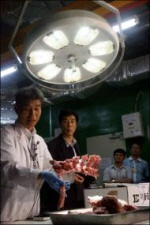



Producers Slam Tougher U.S. Tests For Canadian Meat, Poultry
US - The United States is imposing tough new restrictions on Canadian meat and poultry exports after concerns were raised about inspection practices at an Alberta packing plant believed to be the source of an E. coli outbreak in eight states. |
|
Meat inspection
|
The U.S. Department of Agriculture's Food Safety and Inspection Service said that, beginning this week, it will boost testing of Canadian meat products for salmonella, Listeria monocytogenes and Escherichia coli.
The agency also said it will immediately begin an audit of the Canadian food safety system that will focus on the Alberta plant in question, Rancher's Beef Ltd. of Balzac, Alta., and will "include other similar establishments that export beef to the U.S."
Products will be held at the border until they test negative for the three pathogens, the agency said.
Products from Rancher's Beef sold by the Topps Meat Co. were linked last month to an E. coli outbreak that sickened about 40 people in the United States. Topps was forced out of business after a massive recall in September. Rancher's Beef - which was set up partly to help Alberta beef producers recover from the 2003 mad-cow crisis - also had to cease operations.
The move by U.S. regulators is a blow to the Canadian beef industry and is unwarranted, said Ted Haney, president of the Canada Beef Export Federation.
"We view this as a matter of deep concern," he said in a telephone interview yesterday.
Some Canadian producers have indicated they plan to scale back processing volumes and not export to the U.S. until they have a better understanding of what is going on, he said.
"This is a disruption of trade, a disruption of price and a disruption of production. We don't need this at this time, with the cost of regulation in Canada, the lack of market access in Asia," he said, adding that he hopes the move is not politically motivated to protect the U.S. beef industry.
At the very least, he said, the action is an unreasonable one that unfairly implies that Canadian testing is not on par with that in the United States. "This simply can't be justified, as if there is a greater risk in Canada," he said.
"This is an extraordinary position to take," he said, pointing out that it flies in the face of the policies of the North American Free Trade Agreement and the World Trade Organization.
"It was done without consultation, it was done unilaterally, it doesn't reflect the risk of E. coli in both Canada and the United States."
He said that in the Topps case, three new toxic strains of E. coli were actually found, but only one was traced back to its source.
In a recall that is unrelated to the efforts to tighten Canadian imports, Cargill Inc. of Minneapolis said it is recalling 454,000 kilograms of ground beef that may be contaminated with E. coli. No illnesses have been reported, said John Keating, president of Cargill.
Further Reading
|
|
- Find out more on poultry diseases by clicking here. |
|
|
- Go to our previous news item on this story by clicking here. |











